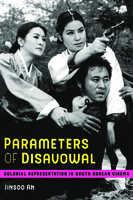Parameters of Disavowal
Colonial Representation in South Korean Cinema
Abstract
The colonial experience of the early twentieth century shaped Korea’s culture and identity, leaving a troubling past that was subtly reconstructed in South Korean postcolonial cinema. Relating postcolonial discourses to a reading of Manchurian action films, kisaeng and gangster films, and revenge horror films, Parameters of Disavowal shows how filmmakers reworked, recontextualized, and erased ideas and symbols of colonial power. In particular, Jinsoo An examines how South Korean films privileged certain sites, such as the kisaeng house and the Manchurian frontier, generating unique meanings that challenged the domination of the colonial power, and how horror films indirectly explored both the continuing trauma of colonial violence and lingering emotional ties to the colonial order. Espousing the ideology of nationalism while responding to a new Cold War order that positioned Japan and South Korea as political and economic allies, postcolonial cinema formulated distinctive ways of seeing and imagining the colonial past.
Keywords
Korean cinema; colonialism; postcolonial culture; film genre; historical film; space in film; national identity; Cold War; Japan; Kisaeng; South KoreaDOI
10.1525/luminos.51ISBN
9780520295308OCN
1051782252Publisher
University of California PressPublisher website
https://www.ucpress.edu/Publication date and place
Oakland, 2018Series
Global Korea, 1Classification
Films, cinema
History
Asian history
Media studies


 Download
Download